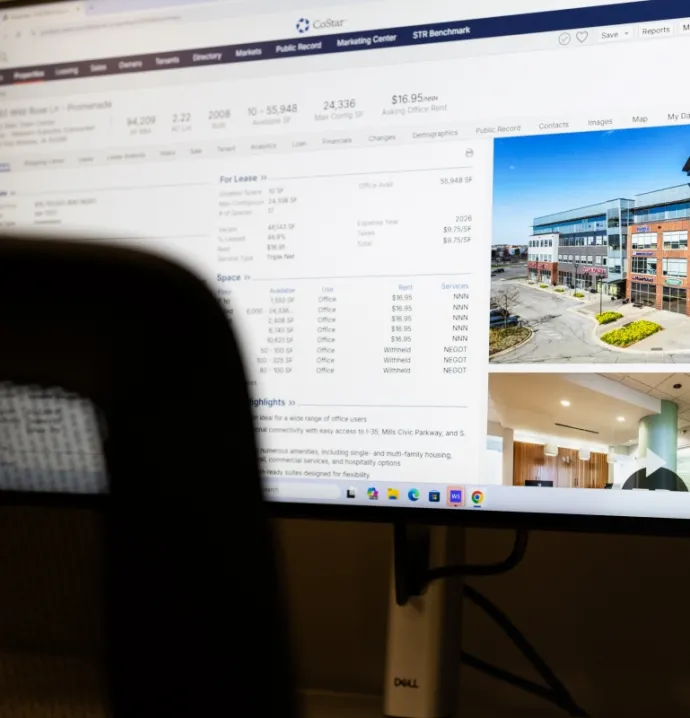Is history on repeat? Former UNI student body presidents weigh in on the changes
Is history on repeat? Former UNI student body presidents weigh in on the changes
Seen from the eyes of past student body presidents, the University of Northern Iowa is both completely the same and totally different.
Four former student body presidents and graduates from the College of Business Administration shared the highlights and struggles of their terms across four decades, illuminating along the way the universal struggles of the college experience and the unique challenges brought on by current events.
From coping with the fallout of Vietnam to struggling through the Great Recession to elevating student voices from underrepresented populations as the country reckons with systemic racism, these presidents brought their experiences and knowledge from their business curriculum to the table as they strove to improve both the UNI campus and student experience. And along the way, they gained insight into themselves that would last a lifetime.
Craig Lathrop (Management ’81)
Life was different on the UNI campus in the early 1980s. And the easiest way to illustrate how is to look at one of the issues Craig Lathrop worked on while student president in 1981: His administration fought to keep keg parties in the dorms.
While unthinkable now, dorm keg parties were common back then, as the legal drinking age was 18. But a few shindigs got out of hand, prompting UNI senior leadership to call for their end. But Lathrop was able to successfully argue against the action by showing that these parties kept students with their friends on campus rather than driving to bars or carousing on the hill.
It was one of the successes of his year as president, but it wasn’t his only triumph.
Lathrop, now the director of cloud architecture at Oracle, counts his greatest success to be the creation of CATE, the course and teacher evaluation handbook. It was the first time students at UNI were able to provide feedback on their classroom experience. In Lathrop’s second semester as president, there was a CATE handbook for every course.
“We hadn’t had one of these before at UNI, but I took a perspective that the students are consumers and should have an opportunity to decide on the quality of educators they wanted,” Lathrop said.
Lathrop also dealt with the rising cost of college, in tuition, which he said increased 11% during his term, and student expenses outside of UNI. While he was president, the price of gas increased from $0.30 a gallon to $1.20 a gallon. The stark increase meant many students were unable to travel home during the weekends, and Lathrop organized several events, including a concert and an evening with the Chicago-based improv troupe Second City, to give students something to do on the weekend.
“It was also a different time. Most of us grew up in a time where we believed everything politicians said."Craig Lathrop (Management '81)
Student activism was still present on campus. The preeminent issue was student protests against bringing ROTC to campus, which were fueled by lingering resentments about Vietnam, Lathrop said. But the protests he remembers were smaller than what you see today, as college students speak out against inequality and systemic racism in higher education.
“There were some protests, but there weren’t any social applications back then, so there wasn’t a lot of it,” Lathrop said. “It was also a different time. Most of us grew up in a time where we believed everything politicians said.”
In the end, Lathrop said his presidential term was positive for his career. He was elected as an outsider at a time when student presidents were often chosen from within the existing political infrastructure. The resentment he faced taught him valuable leadership lessons.
“I had to find a way to work with enemies and find something to like about a problem person to get their help,” Lathrop said. “I learned to care about a team and who they were and let them know I care about them.”
Joe Murphy (Economics ’06)
One of the defining issues of Joe Murphy’s year as student president was one all too familiar to college students today: the rising cost of college.
In the early 2000s, the cost of college was skyrocketing. Murphy said tuition increased 12% his first year and 15% his second. When elected president his senior year, Murphy, now the executive director of the Iowa Business Council, decided to focus efforts on the state legislature to combat these increases.
“Our goal was to have stable, predictable and as low tuition rates as possible, predicated on the legislature funding universities so the rates would remain stable,” Murphy said.
He approached this strategy in multiple ways. First, he focused on getting student voices in front of state lawmakers.
“It’s important to get involved so people hear your voice and share your personal stories of how decisions made in the halls of state capitals have an impact on a person’s ability to go to school,” Murphy said.
He also played the long game, getting involved in the fight to pass Iowa’s tobacco tax in hopes that the money it could save in the public health sector could be redistributed to fund education.
At the end of the day, we were really focused on trying to elevate the students’ voice to the administration about concerns, whether it be scheduling issues or public health issues or university issues.Joe Murphy (Economics '06)
Back on campus, Murphy remembered debate swirling around the Iraq War, as students came out both for and against it. And although it was an issue outside of the purview of his government, Murphy also tackled an issue much closer to home.
In Murphy’s time, UNI’s Thanksgiving break was only three days, compared to a full week at Iowa and Iowa State.
“I always thought that was crazy and poor planning,” Murphy said. “It made all the sense in the world to take those two days off before Thanksgiving. That was a platform goal that got a lot of attention. We worked hard to change that when we were there.”
Murphy wasn’t able to accomplish his goal, but in the years that followed, UNI’s Thanksgiving break was eventually extended to a full week. And while he wasn’t successful in that fight, it was a reflection of the goals of his presidency.
“At the end of the day, we were really focused on trying to elevate the students’ voice to the administration about concerns, whether it be scheduling issues or public health issues or university issues,” Murphy said. “We really thought a lot about that and how to amplify that voice.”
After graduating with an economics degree in 2006, Murphy continued his work in the public sphere, even working several years lobbying for UNI. And he said his experience in the business college was critical to his success.
“Being an economics major really helped me think critically about different things. It allowed me to learn about researching data points and the ideas of opportunity costs and cost-benefit analysis,” Murphy said. “It’s come full circle where every issue I address now is on the business side and working with business leaders. It’s helpful to reach back and rely on my experiences at UNI.”
Pernell Cezar (Finance and Marketing ’10)
Pernell Cezar has never liked the term “minority.”
Growing up as a Black child in Gary, Indiana, where 85% of the population is African American, he was in the majority. And then, when he enrolled in UNI, he was suddenly in the minority. But he was still the same.
He prefers the term “underrepresented” when describing students who have traditionally been marginalized from the college experience. And, as the first Black student president, one of his main goals was to develop a campus climate at UNI that supported these populations.
“A big challenge was how to better integrate the diversity of people and leadership to make sure UNI didn’t fall behind on the realities of the rest of the world,” Cezar said. “There was no game plan prior to being president, and it became a shared values initiative on our involvement in helping the administration select a team that embodies that and represents that.”
As president, Cezar was on the search committee that resulted in the hiring of former Provost Gloria Gibson, who, at the time, was the first Black provost in the state. Promoting diverse voices at the senior leadership level was part of Cezar’s strategy to better serve underrepresented students.
“You have to build a climate to welcome those people and support them in the ecosystem,” Cezar said. “That becomes a matter of representation of leadership.”
Apart from the challenges of student inequality, the Great Recession also reared its head midway through Cezar’s term. All of a sudden, he found himself on the frontlines of budgetary battles to keep UNI intact as the global financial crisis worsened.
“Fortunately, being in the business college, we had experts in their fields, and in our daily class discussions, we had thrown the syllabus out the window and were trying to figure out what was happening in the world,” Cezar said. “It was a matter of trying to build some stability behind the direction the university was going, and the work we put in helped put us in a better spot as the recession kicked in.”
Although student equality and the recession were the two defining issues of his presidency, Cezar also developed policies to simplify and consolidate student fees and implement Safe Ride, where he worked with the city of Cedar Falls to keep bus routes around campus open later than usual to ensure student safety.
For Cezar, now the co-founder and CEO of the rapidly expanding coffee company BLK & Bold, his year as president helped cement his leadership style.
“It taught me a lot about myself and how leadership styles are developed - that they are cemented when tested,” Cezar said. “Challenging a university that was complacent on underrepresented students during my time impacted the experiences I could bring when entering into a profession.”
Jacob Levang (Management ’20)
Going into spring break in 2020, Jacob Levang was expecting to return to UNI after enjoying the week off and finish up his term as student body president.
But COVID-19 changed everything.
“I was thrust into doing my job virtually,” Levang said. “How are students getting the internet? How are they getting the resources they need? At the same time, I didn’t really know what was going on. That was the biggest shake-up. All of sudden, I’m doing meetings online and adjusting to online classes. COVID-19 was a real staple of my time here.”
But even before COVID-19 changed the landscape of higher education, Levang was overseeing tumultuous events. Tensions between students and UNI senior leadership over issues of diversity and inequality were reaching a crescendo during his term, resulting in the formation of the student-led Racial and Ethnic Coalition, which took a hard stance in demanding change on campus.
As president, Levang prioritized communicating the frustrations of these students to senior leadership.
“A lot of it for me was listening to the students, that was my first concern,” Levang said. “I would talk to students from different groups and collect as many perspectives as I could. That was my job - to deliver that info to the administration. It wasn’t about me; it was about who I was listening to.”
Looking back now, Levang said his term as president was the most challenging year of his life. But it was also rewarding.
“The thing I’ll remember most is how many people I was able to meet and how many relationships I was able to develop,” Levang said. “I didn’t accomplish even half of what I wanted to, but I’ll be able to hang my hat on those relationships and being able to change the experience of a few people and make them feel like they were cared about and heard.”
His term also changed his career goals. Going into UNI, Levang had ambitions to work for a Fortune 500 company, but now he is focusing on a career in public policy. After graduating in the spring with a degree in management, Levang is starting a job with the U.S. Department of Agriculture while pursuing a master’s degree in public administration at Drake University.
Despite the change in career goals, he said his UNI experience will be critical for his career.
“I stayed in the business college because I learned so much about what it’s like to be a leader and how to work with different people from various backgrounds,” Levang said. “That experience I got while understanding how business works was a great combination.”
Originally published in the 2020-2021 issue of UNI Biz.




